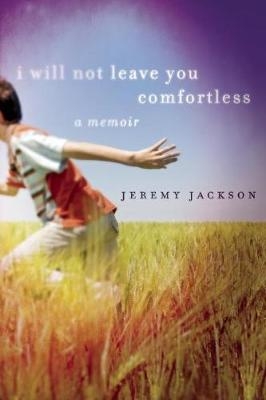
I Will Not Leave You Comfortless
Milkweed Editions (Verlag)
978-1-57131-332-4 (ISBN)
- Titel ist leider vergriffen;
keine Neuauflage - Artikel merken
With storytelling informed by profound sense of place and an emotional memory remarkably sound, Jackson stands poised to join the ranks of renowned memoirists the likes of Tobias Wolff. Readers young and old will be charmed and transformed by his unforgettable coming-of-age tale.
Jeremy Jackson is the author of two novels, Life at These Speeds, a B&N Discover pick, and In Summer, a Booksense Recommends selection. A graduate of Vassar College and the Iowa Writers' Workshop, he lives in Iowa City. Jackson is also the author of young adult novels under the name of Alex Bradley, and cookbooks including, The Cornbread Book, which was nominated for a James Beard Award. He writes about food for the Chicago Tribune and the Washington Post. In His Own Words. . . Though I was born in Ohio, I grew up with my family on a farm in the Ozark borderlands of Missouri. We raised cattle and hay and had a garden the size of Texas. At various times we had horses, cattle, a pig, sheep, chickens, ducks, and a pony. We ate a lot of these animals, but not the pony. We also had wild blackberries and persimmons and walnuts on our farm. And a pear tree. And we caught fish in our ponds. We ate some of them, too. For some crazy reason, I headed off to Vassar College, thinking that I would become a writer. Unfortunately, I did. It was all downhill from there, though the sex was good. From Vassar I went straight into the Iowa Writers' Workshop, where I wrote brilliant stories about bunnies, marbles, and a talking mailbox named Ruth. Then I spent a year writing a novel and a screenplay. Then I went and taught English back at Vassar for two years. Being a professor was a mind-numbing experience, though the sex was good. I quit that job and started being a writer full time, which was very much like being a writer part time except that it took a lot more time and I felt much more guilty when I didn't write anything. I moved from Poughkeepsie back to Iowa, which is kind of like moving from the outer circles of hell to the Garden of Eden. Not Your Average Memoirist: Six Questions with Jeremy Jackson by Will Wlizlo Jeremy Jackson isn’t your typical memoirist. He grew up in rural Missouri and had a mostly happy childhood, unspoiled by the drug addictions, abuse, or financial hardship we’ve come to expect from the genre. His focus, instead, is on the ordinary hard times we’ve almost all facedthe death of a loved one, the fade of a fledgling romance. And yet he evokes the events with a bittersweet clarity, expansive tenderness, and uncommon wisdom that transforms the everyday into the sacred and the personal into the universal. In I Will Not Leave You Comfortless, Jackson chronicles his unforgettable eleventh year, when he lost more than a girlfriend and a Pinewood Derby race. He lost his innocence. Here, Jackson talks about unboxing his childhood memories, not seeing the weather, and almost getting married in fourth grade. Milkweed Editions: In the memoir, you take the freshman composition maxim write what you know” to a whole new level. How did you remember the past with such clarity? Jeremy Jackson: I wrote Comfortless in part as a way to discover and understand a fuller version of the family’s story than I understood at the time, as a boy. Sort of a write what you know” plus write toward what you want to know.” My memory of my childhood is good, but the book creates an illusion that I remember it spectacularly well. Luckily, I had access to a trove of family documents from the time I was writing about. My most important sources included items like my family’s daily calendars, my grandmother’s journals, and dozens of dated and labeled photographs. But I had many, many more things, like a tape recording of my grandmother’s funeral, my sister’s journal, notes girls at school had written to me, and the notepad that sat at my grandmother’s hospital bedside for months. Additionally, my parents were excellent sources, because they recalled many events that I wasn’t even present for. So my research helped immensely in recreating a fuller version of the family story than I remember. While writing Comfortless, what was a once-lost childhood memory you unearthed that was especially pleasurable to remember? There’s hardly a page of the book (at least the ones where I am present) that doesn’t have some tidbit that I retrieved from the deep reaches of memory. The time our little black cat rode on top of the car to town, for example. Or how I built my Pinewood Derby car backwards that year, and didn’t realize it until the night of the races. Buying earrings for the girl I had a crush on. The way my grandmother would give me cut-up brown paper bags to draw or paint on. Pick a page and I’ll point out something that I had semi-forgotten but recovered during the writing of the book. In the memoir, life-changing events like your grandmother’s death are presented alongside less weighty memories like losing the Pinewood Derby. As inconsequential as the latter may seem, the experience can be just as memorable as the former. Why do you think everyday experiences loom so large in childhood? Oh, the world is fresher when you’re a kid, isn’t it? Or, really, you’re fresher, and the things that are happening to youbig and smallare being etched right into your brain. Your parents were forced to take care of both their young children and their aging parents. What did you learn about caregiving and family resilience during this time? I think one of the things the book does is show how the generationsof any familymove forward inexorably and simultaneously. One of the structural tensions in the book is the contrast between my grandmother’s story (the older generation passing on) and my sister’s story (the younger generation coming into maturity). The stories in a family can be both sad and triumphant at the same time. During the writing and publication of the book, I also got married and became a father, so I entered a new life stage, and this made me appreciate and understand my parents’ roles as the middle generation taking care of both the younger generation and the older generation. Comfortless is as much a story of your family as it is of everything in your environmentvolatile summer storms, fresh cow’s milk, wild pink mulberries, the smell of Missouri soil. How does place influence you as a writer and as a Midwesterner? For me, setting is one of the most important and dynamic parts of a story. I love the Midwestern landscape and weather. I lived on the East coast for six years, and I was constantly frustrated that I couldn’t get a good view of the sky or horizon through all the trees and buildings. I couldn’t see the weather! I couldn’t see storm clouds coming, which was upsetting a) because you needed to see them coming so you could be prepared and b) they are beautiful. In one particularly comic scene, you’re standing in the schoolyard, waiting to get married” to Toni Renken, a girl in your class. In retrospect, if you could live the crush all over again, what would you do differently? I still find the concept of our semi-arranged playground marriage to be hilarious. A few years ago I talked with one of the girls who helped organize the wedding,” and she recalled that she and some of the other girls got into a little bit of trouble over the whole thing. I think the teachers didn’t like them playing at being grown ups so literally. But really, it just wasn’t meant to be. You can’t force a thing like that.
| Erscheint lt. Verlag | 18.10.2012 |
|---|---|
| Verlagsort | Minneapolis |
| Sprache | englisch |
| Maße | 139 x 215 mm |
| Gewicht | 425 g |
| Themenwelt | Literatur ► Biografien / Erfahrungsberichte |
| ISBN-10 | 1-57131-332-X / 157131332X |
| ISBN-13 | 978-1-57131-332-4 / 9781571313324 |
| Zustand | Neuware |
| Informationen gemäß Produktsicherheitsverordnung (GPSR) | |
| Haben Sie eine Frage zum Produkt? |
aus dem Bereich


